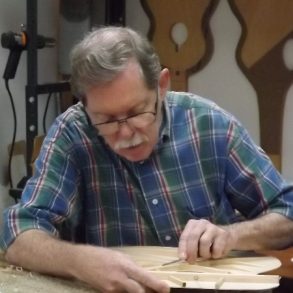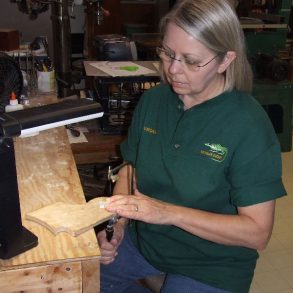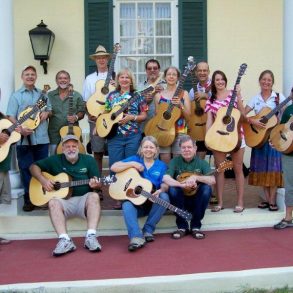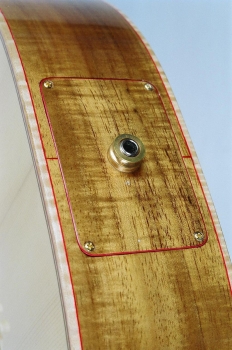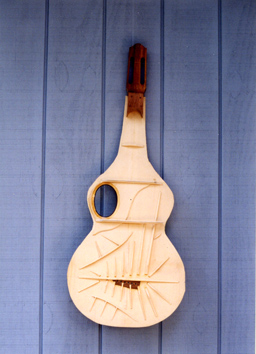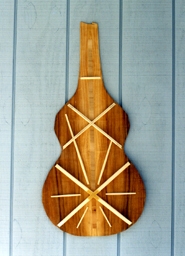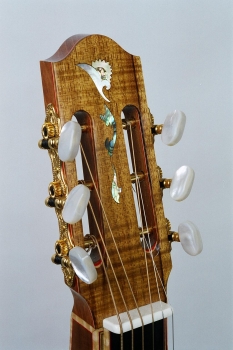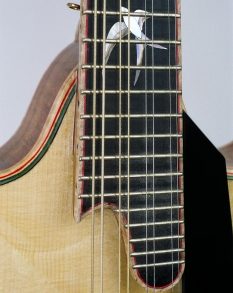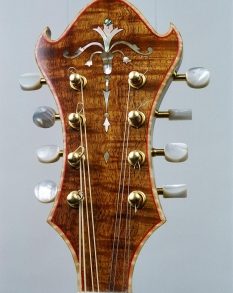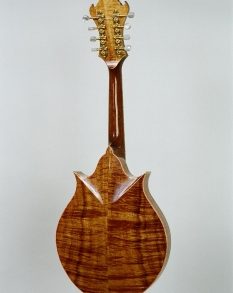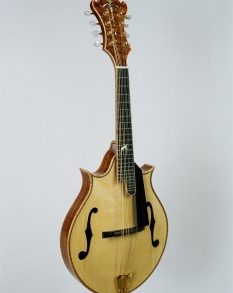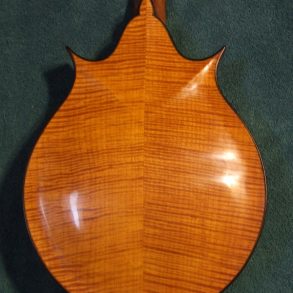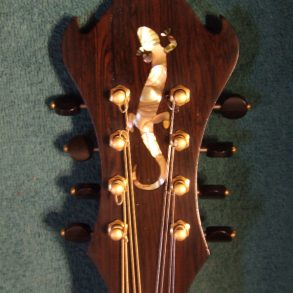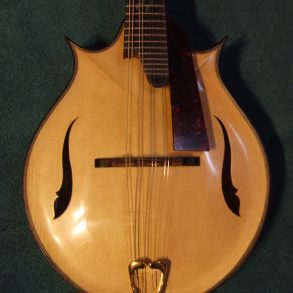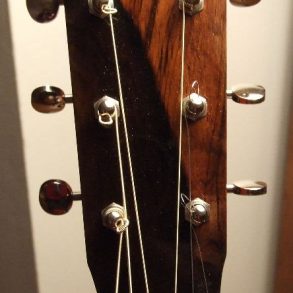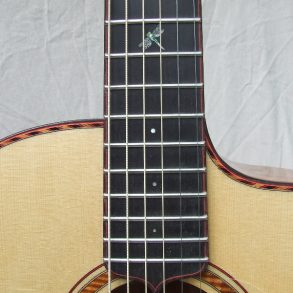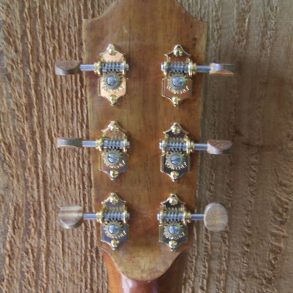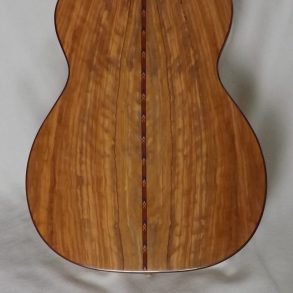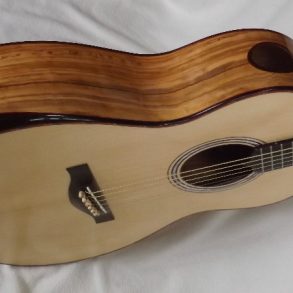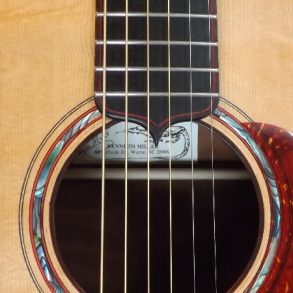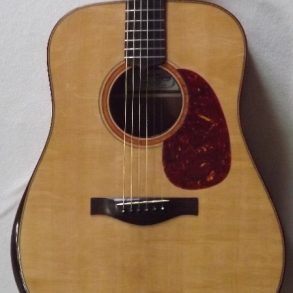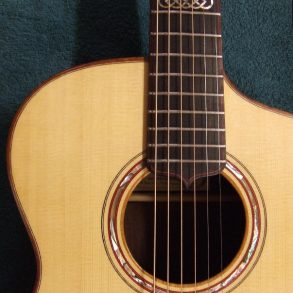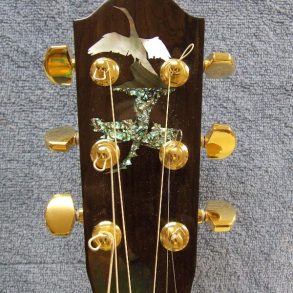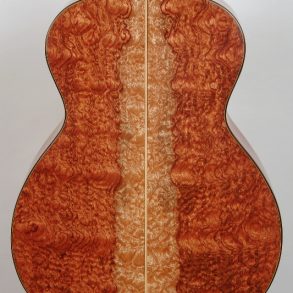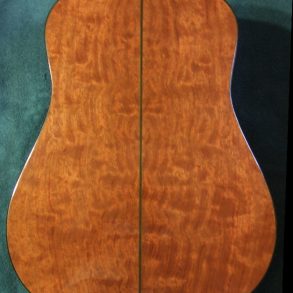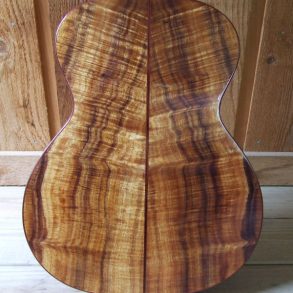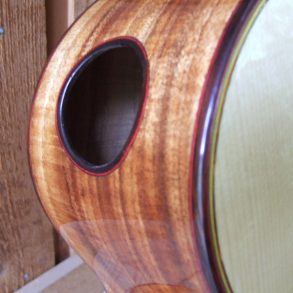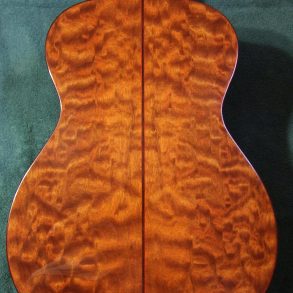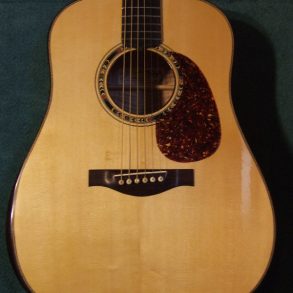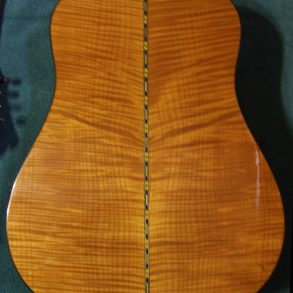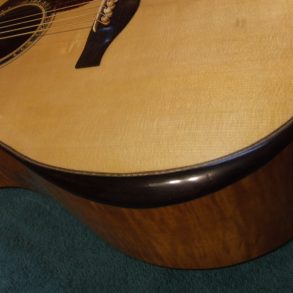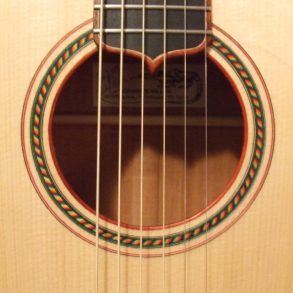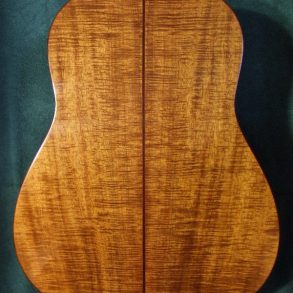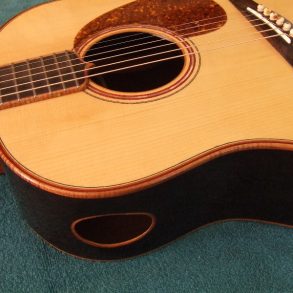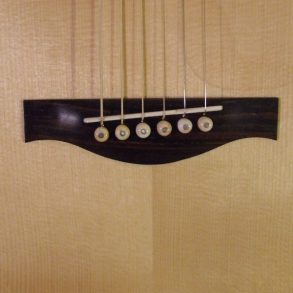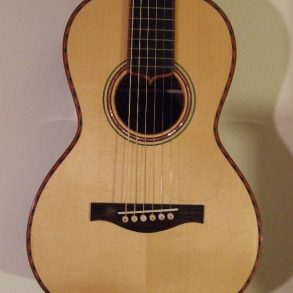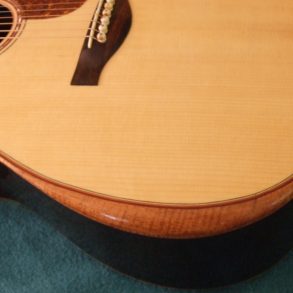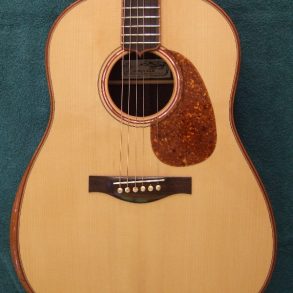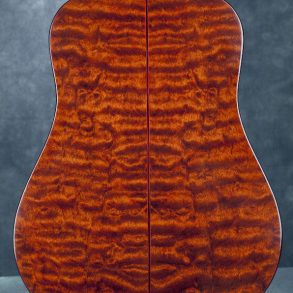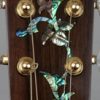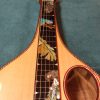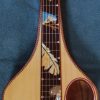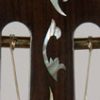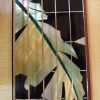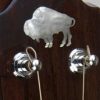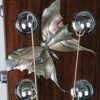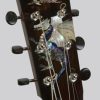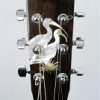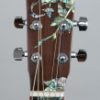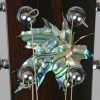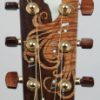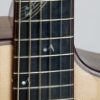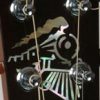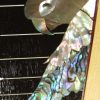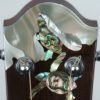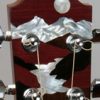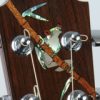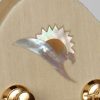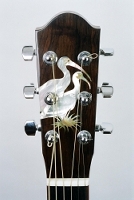
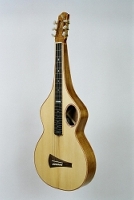
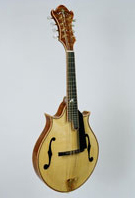
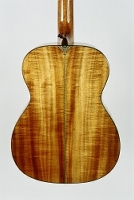
Ken Miller has retired and is no longer taking orders. We have wood, parts and equipment for sale. Please contact us if interested: [email protected]
About us
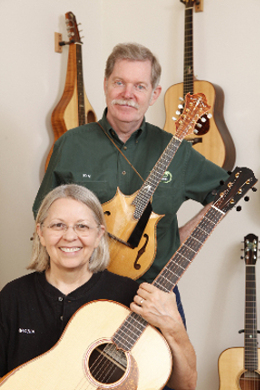
Acousteel
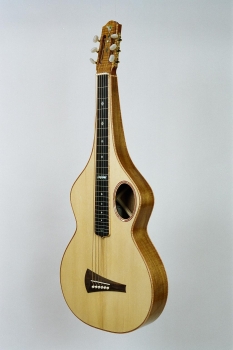
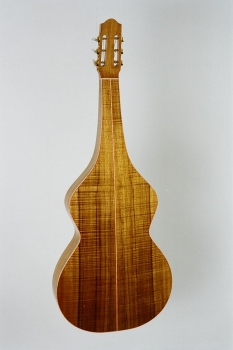
The Acousteel is my modern redesign of the old Hawaiian acoustic steel guitars of the 1920’s. The unusual bridge and internal bracing are taken after the research and developments of Dr. Michael Kasha and Luthier Richard Schneider who originally designed this asymmetrical style of bracing for classical guitars. The modern design and bracing patterns, combined with the highest quality materials and construction, produce an instrument which goes beyond the short-lived promise of the older instruments. I have also overcome many of the shortcomings of “resonator” guitars – such as rattle, poor volume, and amplification. These instruments will be able to take acoustic “steel guitars” into all forms of music. I am making these guitars with Koa back and sides and bridges, Red Spruce face, Ebony fingerboards, and Grover vintage style tuners.
Base price is $6,000 with a hard shell case.
Classical & Flamenco
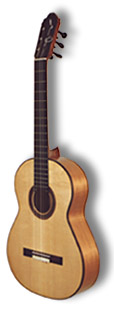
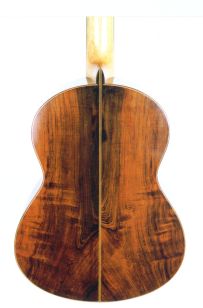
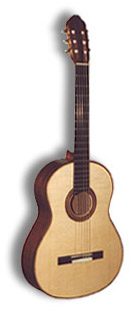
My Classical and Flamenco guitars are modeled after the guitars made in Madrid, Spain circa 1930, such as those made by Santos Hernandez. They tend to be slightly smaller and more “feminine” looking than most of what is being built today, yet they still have a standard 650 mm scale length. This reflects my concern that the modern guitars are losing sight of the wonderful designs and sounds produced by the earlier era.
My Flamenco guitars have Cypress back and sides, with friction tuners standard. I build the Classical guitars with a variety of woods; some beautiful Brazilian Rosewood, and I also have very nice Koa, Claro Walnut, Curly Maple and other exotic woods. I prefer use Brazilian Rosewood for bridges and I always use Ebony for fingerboards. I prefer spruce for the face of my guitars, a wood which grows in sound over the years. I use only best quality materials throughout. The design and construction of these guitars is by the traditional Spanish method.
The classical guitars come with Deluxe Gold Gotoh tuning machines, and these instruments come with a TKL hardshell case.
The base price for the Flamenco guitar and for the Classical guitar is $6,000
Mandolin
The unique design of our mandolins has evolved from our efforts to combine the look and sounds of the older European with the power of the newer American instruments. We use wood bindings and unkerfed linings, along with “tone bar” bracing. We use Adirondack Spruce for the face and internal braces, and though Maple is the traditional wood for the back and sides, we will occasionally use Koa, Walnut or Brazilian Rosewood if a customer so desires.
Base price for Maple back and side is $6,500. Other woods available.
Steel String
We build guitars in a variety of sizes and shapes, and with a wide variety of tone woods according to the customer’s preference. We typically use Adirondack (Red) Spruce for the face and internal bracing, unkerfed linings of Cypress, and Mahogany necks. We make our necks with graphite and/or adjustable truss rod reinforcement, and use Ebony for fingerboards and Brazilian Rosewood for bridges. We use Ivory for nuts and saddles. Bridge pins are of Ivory, Bone, Horn or Wood to complement the aesthetic and sound qualities of each individual instrument. A wide variety of metals, shell, stone and woods are available for inlay work. All of our instruments are equipped with a hardshell case. The base price for our guitars is $6,000. Extra fancy wood and/or additional inlay work is available.
Stringed Instrument Care
Proper care of your musical instrument can lengthen its active life, reduce repair bills, and help retain its monetary value. Proper care can also help avoid problems and “down time”.
The three most common things which damage a guitar are sweat, alcohol, and tobacco smoke/ash. These three, separately or together, can ruin frets, finish and metal parts. Wiping your instrument with a clean soft rag after playing will remove most of these elements. A light coat of wax such as a commercial guitar polish or even Pledge will help even more. The wax will help seal the finish and keep it from absorbing moisture and dirt.
Wax will hurt your strings, so it is best to wax an instrument when the strings are off. Changing the strings is the prime time to do regular maintenance on your guitar.
You may change strings as often as before each gig or as little as once a year. Usually bass strings are changed less often, perhaps because of cost, but also because they seem to last longer than the thinner strings. While your strings are off, check ALL screws, nuts, etc. for looseness. Especially check the tuners. Everything should be firm, not tight or loose. Checking your tuners with the strings off will also let you know if they are still working smoothly or are wearing out. Keeping them properly adjusted will considerably lengthen their working life. At this time clean the fingerboard and frets with a mild abrasive such as a Scotchbrite pad; just enough to make the frets shiny and to remove the fried chicken from the board!
If your fingerboard or bridge is unfinished wood, give them a coat of Raw Linseed oil. Put on enough to make them wet then polish it off with an old piece of cloth. What you can’t get off is the proper amount to leave on. If your fingerboard is finished (painted) like the rest of your instrument, do not use the linseed oil but use the same wax/polish that you use on the rest of the guitar. Remember that wax or oil is not good for the strings, so be sure not to leave excess wax or oil on the fingerboard. At this time polish the remainder of the guitar, making sure that everything is as clean as possible. If you are getting corrosion on any metal pieces or mechanisms a little machine oil will help avoid future repair bills. After putting oil on the various mechanisms, blot off as much as possible. Minimum lubricant and on the proper places is the game. Do NOT use WD40 as it will cause future damage. Restring with the proper gauge of strings and you are ready to play – with a really fresh instrument.
As with any device, the mechanical aspects of your instrument need to be checked and/or adjusted once or twice a year to maintain maximum playability. Your needs will match the demands of your playing schedule. Professional musicians usually have a traveling “Tech” who is part of the band and maintains all of the instruments on a constant basis. A private musician may elect to learn to do his own work or find a competent repair person to handle the work. Use common sense if possible, and make a joyful noise!
Features, Terms, Warranty
Standard Features of Our Instruments
Our instruments are bound – including fingerboards – using wood bindings, purflings and marquetry. Each sound hole rosette on all of our instruments is designed and created one at a time. Though we will use any materials that a customer might desire, we usually use Ebony for fingerboards with stainless steel frets, Brazilian Rosewood for bridges and Red (Adirondack) Spruce for the soundboard and internal bracings. We use unkerffed linings and we prefer to use Ivory for the nut and saddle. Bridge pins and Strap Buttons are made of Ivory, Bone, Horn or Woods, to match the acoustic and aesthetic requirements of each individual instrument. We have a good supply of highest quality tone woods such as Brazilian Rosewood, figured Mahogany, Koa, Walnut, Maple and other beautiful woods for customers to choose from.
Our instruments are very lightly constructed without compromising the structural integrity of the instrument. We build the neck and fingerboard for maximum ease of playability and that, combined with precision setup produces an instrument that is a joy to play.
We do not build “standard models“. Each of our instruments is a unique, handcrafted work of art and sound, custom built for the individual owner. We make a wide variety of sizes and styles of instruments. Though we are inspired by vintage instruments and incorporate many of their best features in our work, we do not build copies or use “45” style Abalone edging. We build acoustic instruments, but pickup installation is an option. We recommend Pick-Up-the-World pickup systems.
Guitar Pricing 2014
Our basic guitar will have regular Koa, Mahogany or Walnut back and sides, Adirondack (Red) Spruce soundboard and bracing. Ebony fingerboard with stainless steel frets, Brazilian Rosewood bridge, wood bindings and marquetry. Simple inlay on the peghead and at the 12th fret of the fingerboard. Bryan England handmade bridge and strap pins. Nickel Grover tuners and a Cedar Creek custom hardshell case.
Basic Guitar – we are not currently accepting orders.
Options
Fancy Woods:
Maple + up to $500
Mahogany + up to $500
Quilted Mahogany from “The Tree” + $4000 – $6000
Walnut + up to $500
Koa + $300 – $1000
Brazilian Rosewood + $2000 – $6000
“Lucky 12” Sitka Spruce Soundboard + $500
“Bear Claw” Adirondack Spruce Soundboard + $600
Full coverage “Bear Claw” Sitka Spruce Soundboard + $300
Cut Away + $800
Sound Port + $200
Armrest/Beveled Edge + $800
Shell Rosette + $150
Ivory Bridge Pin & Strap Pin set + $250
Stainless Steel Fret wire – now standard
Pick-Up-the-World sound system + $285
Other systems – at cost
Tuners:
Gold Grover or Schaller + $50
Waverly Tuners – at cost
Wood buttons to match the back & sides + $100
Calton, Pegasus, Ameritage, etc cases – at cost
Extra Inlay Work, Engraving or Carving, and other exotic or local
woods are available for your specific dreams, please ask.
Procedures & Terms
Work on Custom instruments will be started upon receipt of a 50% Non-refundable deposit. The balance will be due upon completion.
Any in-stock instrument may be reserved for 30 days with a 10% Non-refundable deposit. The instrument will be shipped upon receipt of the balance.
In-stock instruments may be shipped for a 7 day approval upon receipt of the purchase price. If the customer decides not to purchase the instrument the money will be refunded (minus shipping costs) when the instrument is returned in its original condition.
Warranty
Our instruments are guaranteed to be free of structural or material defects, to the original purchaser. If problems arise which we deem to be our responsibility we will correct them. We expect the owners of our instruments to maintain them with regular service and a friendly environment. Evidence of abuse or neglect may void the warranty.
